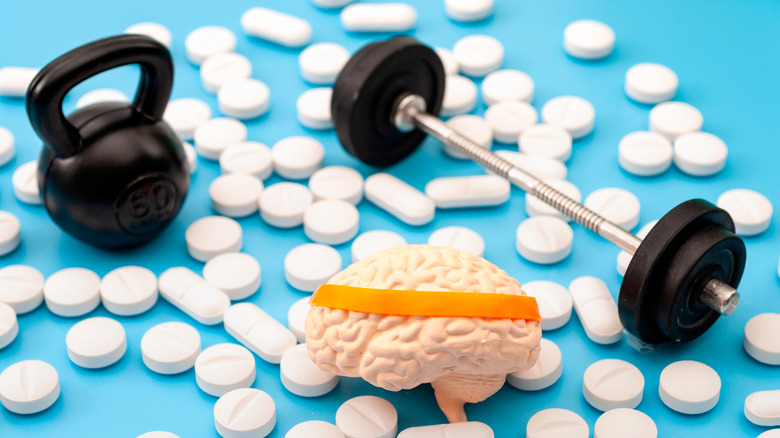Read This Before Taking Nootropics
Have you watched "Limitless?" The storyline revolves around NZT-48, a nootropic drug that enhances memory and cognitive performance. Edward Morra, the lead character, realizes that he's able to fully use his brain and process information at lightning speed after taking just one pill. Soon, he begins to use his new abilities to build a better life. The movie is a work of fiction, but nootropics are real. Although these little pills won't give you superpowers, they can boost your energy, alertness, and cognition.
Smart drugs, or nootropics, have been around in one form or another for centuries. American ginseng, ginkgo biloba, rhodiola rosea, and caffeine are just a few examples. Caffeine, for instance, can improve attention, vigilance, reaction time, and physical performance, suggests a 2016 research paper featured in Neuroscience and Biobehavioral Reviews. L-theanine, an amino acid found in tea, increases mental alertness (via the Asia Pacific Journal of Clinical Nutrition). Piracetam and other synthetic nootropics are even more potent, but they also carry a higher risk of side effects.
These so-called cognitive enhancers can be a good choice for students and business professionals. After all, we could all use some extra energy when working late at night. However, there are some things you should know before taking nootropics. Let's dive in!
Not all nootropics are created equal
Nootropics, whether natural or synthetic, can boost brainpower and mental focus. Bacopa monnieri, for example, may enhance memory and cognition while protecting your brain from oxidative stress. Research also suggests that it reduces anxiety, according to a 2016 review published in Evidence-Based Complementary and Alternative Medicine. Panax ginseng and Ginkgo biloba have similar effects. Both plants fight oxidative stress, boost cognitive performance, and support memory function. Rhodiola rosea, on the other hand, can improve your ability to cope with stress.
Synthetic nootropics, such as piracetam or sunifiram, protect against brain damage and cognitive impairment, suggests the above review. These drugs can also enhance learning and memory while preventing cognitive deficits. Adderall and other stimulant drugs increase dopamine levels in the brain, leading to improved alertness and mental energy. On top of that, they can lift your mood and allow you to stay focused for longer, explains Psychology Today.
These drugs can be used alone or combined to increase their efficiency. The downside is that they may interact and cause adverse reactions, warns Psychology Today.
Nootropics are not magic pills
Smart drugs are increasingly popular among Silicon Valley entrepreneurs, reports ABC News. "I would not give them up willingly," says business and empowerment coach Erin Finnegan. "The additional focus that I can have with them, yes, it does sustain the speed I am going at now and the many things, I would have to take a couple [of] things off my plate if I wanted to keep going without them," she added.
American entrepreneur Dave Asprey, on the other hand, uses a mix of nootropics, including piracetam, cobalamin, and other drugs, to keep his brain sharp. "One may help bolster memory, another will help you focus. One of his pills helps improve vision, and another promises more energy. They all have the same goal — to help you maximize your potential," he told Business Insider.
However, nootropics are not magic pills and can have serious side effects. Except for Ginkgo biloba, most smart drugs lack scientific evidence, according to the University of Miami Health System. These supplements increase the levels of gamma-aminobutyric acid (GABA) in the brain, making you feel calmer. But more research is needed to confirm their safety and effectiveness. For example, research suggests that people tend to overestimate the efficacy of Ritalin, Adderall, and other stimulants because of the placebo effect, explains Psychology Today.
Beware of the dangers of smart drugs
Nootropics are generally safe, but you may still experience mild to moderate side effects. A review of 165 studies on 77 smart drugs found that most products were well tolerated. Common side effects include headaches, dry mouth, dizziness, anxiety, and digestive distress, reports Psychology Today. However, synthetic nootropics may cause more serious adverse reactions. Piracetam, for instance, can lead to memory loss, restlessness, dissatisfaction, fatigue, and diarrhea (per Innovations in Clinical Neuroscience). Citicoline, a popular nootropic, can cause insomnia, muscle aches, tremors, and digestive problems.
Psychology Today recommends starting with a small dose and increasing it gradually. You may combine two or more nootropics later on, but it's best to discuss your options with a medical professional. Also, note that some compounds may not be safe for those with existing health problems. Piracetam, for example, is contraindicated in people with Huntington's disease, severe renal impairment, or brain hemorrhage. Additionally, it can interact with thyroid medications, according to the Electronic Medicines Compendium.
All in all, nootropics won't turn you into a superhuman. These supplements may improve brain health and mental function to some extent, but their efficacy is limited. As registered dietician Jason Stevenson told the University of Miami Health System, "You need to 'EARN' your physical, mental, and emotional health. That stands for Exercise, Attitude, Rest and Recovery, and Nutrition." A balanced diet combined with regular exercise and proper rest can do more for your mental and physical health than any pill.




